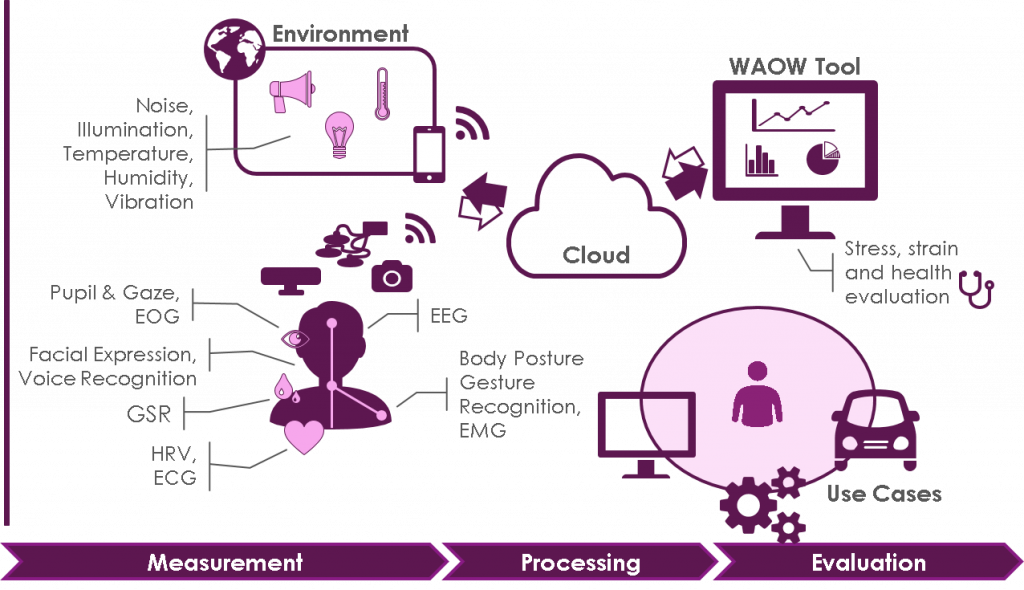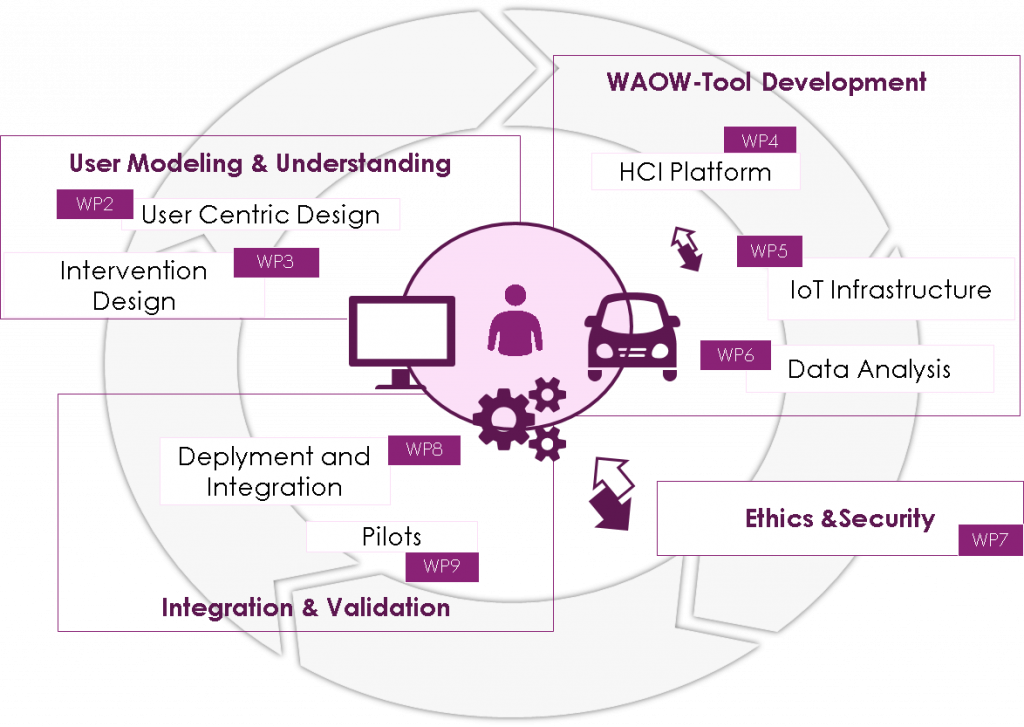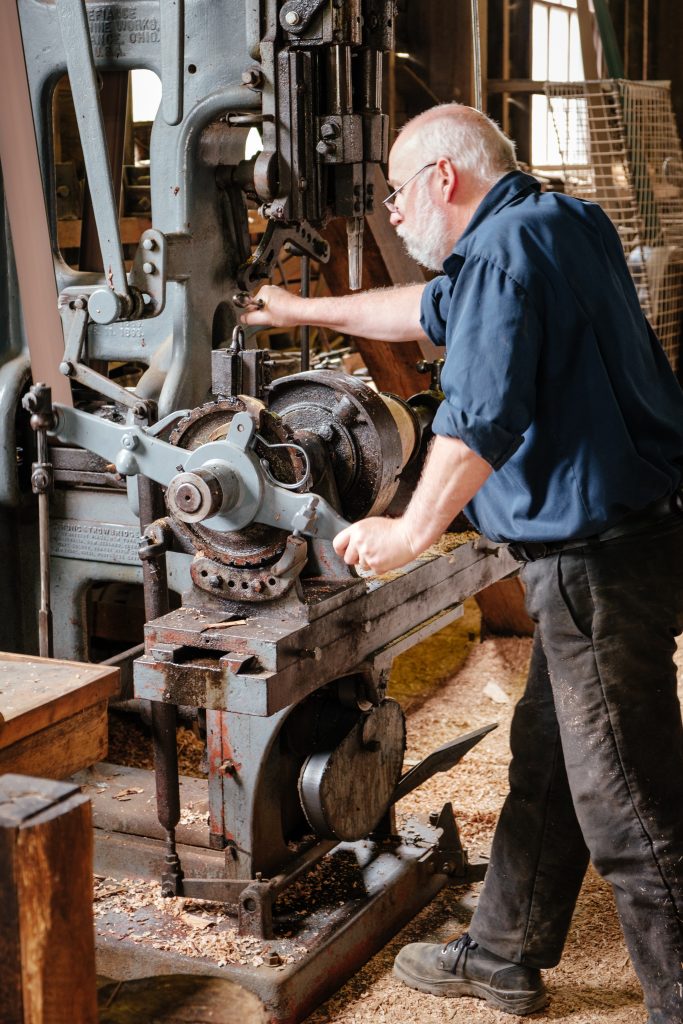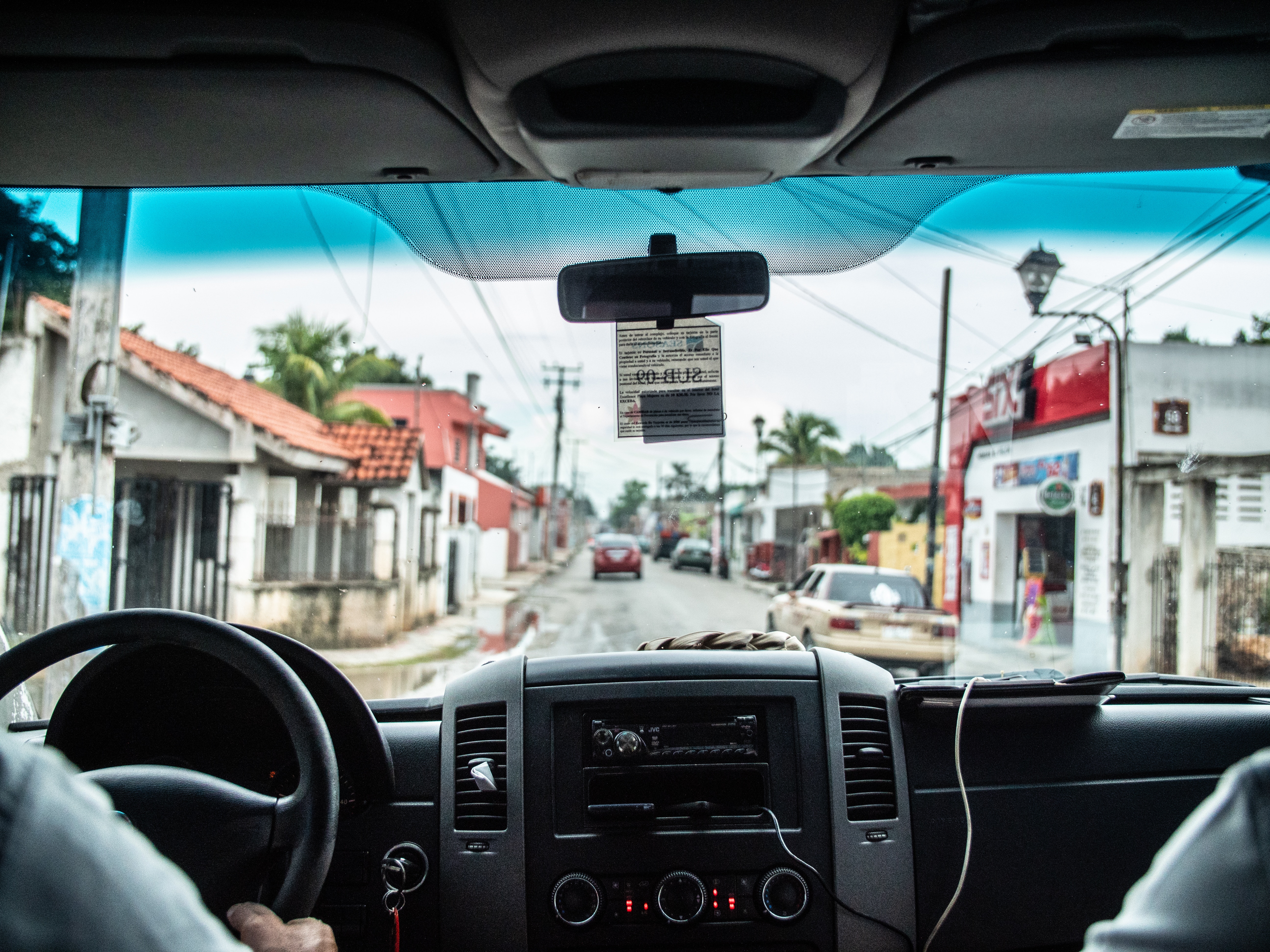PROJECT OVERVIEW

At a Glance
In a society where employment is prolonged to higher ages, the WorkingAge project studies and promotes healthy habits in working environments focusing on people aged over 45. Gaining a better understanding of well-being at work and of factors that may inhibit or deteriorate prolonged employment, desirable living situations at older age are pursued, characterized by autonomy and quality of life.
An integrated digital solution, the WorkingAge of Wellbeing (WAOW) Tool, will support this by studying three types of working environments: Office, Teleworking and Manufacturing. These environments are being made fit for workers over 45, and validated in extensive pilots.
The WAOW Tool provides workers with assistance in their everyday routine in the form of recommendations, risks avoidance and reminders. Monitoring the worker’s behaviour, health data and preferences through continuous data collection provides input for friendly interactions with the user.
This WAOW Tool will evolve to a scalable product that will empower both companies and employees to improve professional lives by attenuating the impact of ageing and improve autonomy and well-being.
MISSION
WA aims at combining the efforts of employers, employees and society to improve the health and well-being of people at work.
It will prevent illnesses at the workplace (including work-related illnesses, working accidents, and stress), by providing an improved, smart environment enriched in comfort and in surveillance thanks to networked sensors.
Moreover, societal elements, such as cohesion among individuals obtained through personalized technology and friendly/intelligent human interfaces, will strengthen the potential for health and well-being at the workplace and a healthy balance between working and private life.

OBJECTIVES
This project will have an impact on enhanced health and safety working conditions and quality of life of older persons at work compared to the current situation, enabling older persons to be able to contribute at an appropriate level for a longer period. The WA project will create five innovative algorithms (Gesture, Face, Eyes, Voice, Neurometrics), which will be aggregated into a contextualized user model to infer user’s emotional state and evaluate the stress and strain level. This system can be integrated with other health, social, location and working parameters for distributed service and connection with emergency services. By understanding the causes for long-term stress and workload of employees and its impact on sickness and rest periods, the WA project will aim to create a set of rules that enable adaptation of the changing status of the workers aged >45 to their working/living environment, as well as create a set of tips and alerts that will increase support of independent living. The objective is to lead to a new application for companies to demonstrate that work is carried out respecting basic health and safety conditions. The system will be evaluated by assessing the improvement of the working environment, health status, independence, functional capacity, physical, cognitive, psychological and social well-being of 70 users (aged >45 through long term tests). This provides evidence on user-centred design and innovation, new intuitive ways of human-computer interaction, and user acceptance.
1
Excellence
The WorkingAge (Smart Working environments for all Ages) project – WA – will focus on the usage of innovative Human Computer Interaction methods, including augmented reality, virtual reality, gesture/voice/expression and affect recognition and gaze tracking, will measure the user’s psychological/emotional/health state, as well as Internet of things (IOT) for environmental conditions, taking into consideration gender, ethics and security aspects.
The WA project will create a sustainable and scalable product that will empower its user’s comfort by easing their work life, attenuating the impact of aging in their autonomy, health and well-being. The WAOW Tool will also analyse users’ health and behaviour outside work and assist with reminders, alerts, risks avoidance advices and recommendations, changing them according to the user needs and characteristics.
The aim is to supervise health while promoting healthy habits of the users in their working/living environment in order to improve their active life conditions.
The system to be designed and developed in WA will provide feedback to the employers regarding changes in the workplace that may lead to an increased level of comfort for the workers and new tools for managing workforces in order to promote flexible and sustainable job longevity measures.
2
Ambition
More focus on what the people, society and working sectors will gain (project objectives are treated in other section) What society and humans will gain with the project? How this project will return its efforts to the society?
WorkingAge aims at combining the efforts of employers, employees and society to improve the health and well-being of people at work. It will prevent illnesses at the workplace (including work-related illnesses, working accidents, and stress), by providing an improved, smart environment enriched in comfort and in surveillance thanks to networked sensors. Moreover, societal elements, such as cohesion among individuals obtained through personalized technology and friendly/intelligent human interfaces, will strengthen the potential for health and well-being at the workplace and a healthy balance between working and private life.
In particular, regarding the independent living and quality of life, WorkingAge aims to:
• Decrease stress absenteeism
• Improved work performance due to higher motivation and involvement in decision-making and to higher confidence in the possibility to change or find a job
• Increase the sense of belonging. Increase self-esteem
• Increase integration of workers within working environment
WorkingAge aims at retaining employment of elderly workers, providing them alternative working schemes. WAOW Tool will consider their desire of working time and free time and the search for reconciling occupational and private obligations. This may lead to a decrease of the number of elders living their work.
Regarding global leadership, WorkingAge aims to drive innovation and growth in the digital economy, by playing an important role in the development of the online world and create new market opportunities, notably for SMEs and new opportunities of online services. In particular, WorkingAge will built a novel ecosystem where digital services will be completely independent of HCI device manufacturers, fostering the wider uptake and adoption of those digital services, by this type of population. Thus, it opens the market of HCI technologies boosting their advancement of adapted interfaces and integration with digital services.


Ethical considerations. Societal and health challenges. Other related projects.

The WorkingAge project collects and analyzes a significant amount of personal data with the aim of improving the quality of life of the participants in their working environments. In this process, it is crucial that ethical concerns in making the participants aware of the data collection, and providing suggestions to improve their lifestyle are taken into account.
To this end, the WorkingAge project includes an ethical committee composed of a representative for each project partner, and led by Politecnico di Milano, which provides guidance on how the experiments should be conducted, and how the interactions with the participants should be performed .
A further concern, given the significant amount of sensitive data collected and handled by the WorkingAge project, is the storage and treatment of the personal data. Indeed, a fundamental right of the participants of the test is that absolute privacy is guaranteed in terms of storage and handling of their data , as regulated by the EU General Data Protection Regulation.
WorkingAge adopts the state of the art of the data encryption and pseudonymization techniques to ensure that the risks of private data leakage are mitigated, and provides clear consent form to the test participants, allowing them to express selective consent for each kind of personal data being collected.

Ageing in good health allows elder to travel, learn new things and live more independently. A multicomponent system, such as WA, is able to address the need for empowering the senior adults (being able to self-manage working and health conditions and receive assistance to counteract them), providing them with confidence to participate to new working and social activities. The consequent societal impact is to enable the social and economic potential of older adults in terms of better opportunities of active ageing by engagement in different sectors of society, like active citizenship, leisure activities, sports and volunteering. This would foster the contribution of older people with chronic conditions to communities, guaranteeing their social inclusion, participation to activities of interest and access to product and services.
Since the lowest employment rate in Europe is reported for the group aged 55 to 64, WA aims at retaining employment of workers of this age category, by providing alternative working schemes. Thanks to the technologies to be implemented, elderly workers will be able to work under an agile scheme, satisfying their needs, but also offering employers the opportunity to have their more experienced staff members available when needed, or in case of skill shortage. Additionally, the WAOW Tool will provide personalised counselling and job-seeking assistance services to elderly workers.
WA will boost European leadership in ICT, at a global level, as the research conducted in its context will influence and benefit from several aspects related to the implementation of the Digital Single Market Strategy. Internet and digital technologies are expected to contribute €415 billion per year to European economy and to create hundreds of thousands of new jobs. Online platforms such as WA drive innovation and growth in this developing digital economy. The WA solution provides users with the possibility of using a range of common and adapted services depending on the HCI manufacturing technologies, such as brain control, eye tracking and gesture recognition, contributing to the creation of a novel ecosystem of smart digital services. Thus, it opens the market of HCI technologies, boosting their advancement of adapted interfaces and integration with existing digital services, constituting low-cost business models realisable and more viable.
See Far. Smart glasses for multifacEted visual loss mitigation and chronic disEase prevention indicator for healthier, saFer, and more productive workplAce foR ageing population.
Ageing@Work. Smart, Personalized and Adaptive ICT Solutions for Active, Healthy and Productive Ageing with enhanced Workability
Bionic. Personalised Body Sensor Networks with Built-In Intelligence for Real-Time Risk Assessment and Coaching of Ageing workers, in all types of working and living environments
Co-adapt. Adaptive Environments and Conversational Agent Based approaches for Healthy Ageing and Work Ability
SmartWork. Smart Age-friendly Living and Working Environment
sustAGE. Smart environments for person-centred sustainable work and well-being
NESTORE. Novel Empowering Solutions and Technologies for Older people to Retain Everyday life activities
CAPTAIN. Coach Assistant via Projected and Tangible Interface.
EMPATHIC. Empathic, Expressive, Advanced Virtual Coach to Improve Independent Healthy-Life-Years of the Elderly
INCLUSIVE. Smart and adaptive interfaces for INCLUSIVE work environment.
MANUWORK. Balancing Human and Automation Levels for the Manufacturing Workplaces of the Future
NEVERMIND. NEurobehavioural predictiVE and peRsonalised Modelling of depressIve symptoms duriNg primary somatic Diseases with ICT-enabled self-management procedures
PILOTS’ INFORMATION
The pilot tests will be performed in Spain and Greece, by end-users organisations from three different sectors: an Industry and an office in Spain, a teleworkers in Greece, led by INTRAS. Individuals and groups of people of up to 70 individuals will be monitored in-laboratory and in-company for a maximum of one year. The monitoring will cover occupational health and safety professionals or human resources managers, while other tests will address the worker’s environment to reach the ultimate goal of prevention and monitoring of psychological, physical, cognitive and social health over a long-range time scale. These experiments will assess the efficiency of the WA system to fetch parameters for analysis, detect a health risk and to deliver an intervention. Pilots will also assess the ability of WA to self-improve.
 |  |  |
